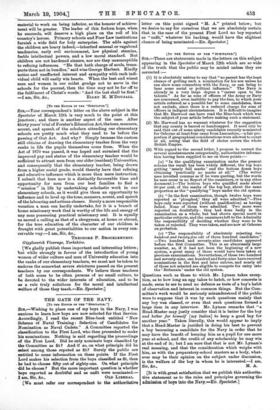LT0 TRH EDITOR OP TIIII ° SPRCTATOR.1 Sfs,—There are statements
made in the letters on this subject appearing in the Spectator of March 12th which are BO wide of the truth that the public may be misled unless they are corrected :— (1) It is absolutely untrue to say that "no parent has the least chance of getting such a nomination for his son unless he can show some connection with the Navy, or can bring to bear some social or political influence." The Navy is already in a very large degree a "career open to the talents." As far as sons of officers of the Army or Navy are concerned, even inability to pay the fees, to which your article referred as a possible bar to some candidates, does not exclude, since there is a reduced charge for sons of officers in indigent circumstances. It is difficult to imagine that Mr. Harwood can have read the Blue-book which was the subject of your article before making such a statement.
(2) Mr. Harwood has no warrant whatever for the suggestion that any county is barred or handicapped. It need only be said that out of some ninety candidates recently nominated for Osborne at least four came from Lancashire,—a fair pro- portion if geographical considerations were allowed to count at all, seeing that the field of choice covers the whole British Empire.
With regard to the second letter. I propose to correct the several misstatements categorically, authoritative informa- tion having been supplied to me on these points :— (a) "In the qualifying examination under the present scheme the result has been widely different, the top boys getting 'nearly full marks' and the bottom dozen boys obtaining 'practically no marks at all.' " (The writer uses inverted commas as if he were quoting, but the words he uses occur in no Report of the examiners, or in any other document.)—The bottom boys who qualified made about 50 per cent. of the marks of the top boy, about the same proportion as the " qualifying " boys under the old system.
(b) "In the first examination, though twelve boys were reported as 'ploughed,' they all were admitted."--Five boys only were reported (without qualification) as having failed. None of them were admitted. Two more were reported on doubtfully : they had done badly in the examination as a whole, but had shown special merit in particular subjects, and the examiners left to the Admiralty the responsibility of deciding whether they were to be taken or rejected. They were taken, and are now at Osborne on probation.
(c) "The responsibility of absolutely rejecting two hundred and twenty-five out of three hundred candidates." —Two hundred and seventy-nine candidates appeared before the first Committee. This is an abnormally large number, as, if it had not been the beginning of a new system, a great many of these would have been taken at previous examinations. Nevertheless, of these two hundred and seventy-nine, one hundred and forty-nine have received nominations in the first and later entries, and nearly all of those not selected are eligible to compete for entry into the Britannia ' under the old system.
Questions such as those to which Mr. Lynam takes excep- tion, as to how long an egg takes to hatch, or how concrete is made, seem to me to need no defence as tests of a boy's habit of observation and interest in common things. But the Com- mittee's work would be seriously misunderstood if the public were to suppose that it was by such questions mainly that any boy was classed, or even that such questions formed a large item in any interview. Mr. Lynam remarks that "a Head-Master may justly consider that it is better for the boy and better for himself [my italics] to keep a good boy for another year." Taken literally, this would appear to imply that a Head-Master is justified in doing his best to prevent a boy becoming a candidate for the Navy in order that he may have the benefit of keeping him as a pupil for one more year at school, and the credit of any scholarship he may win at the end of it; but I am sure that that is not Mr. Lynam's real meaning, and that the consideration which weighs with him, as with the preparatory-school masters as a body, what- ever may be their opinion on the subject under discussion, is the welfare of the boy in whom he is interested.—I am, [It is with great satisfaction that we publish this authorita- tive statement as to the rules and principles governing the admission of boys into the Navy.—Eo. 5pectator.1










































 Previous page
Previous page